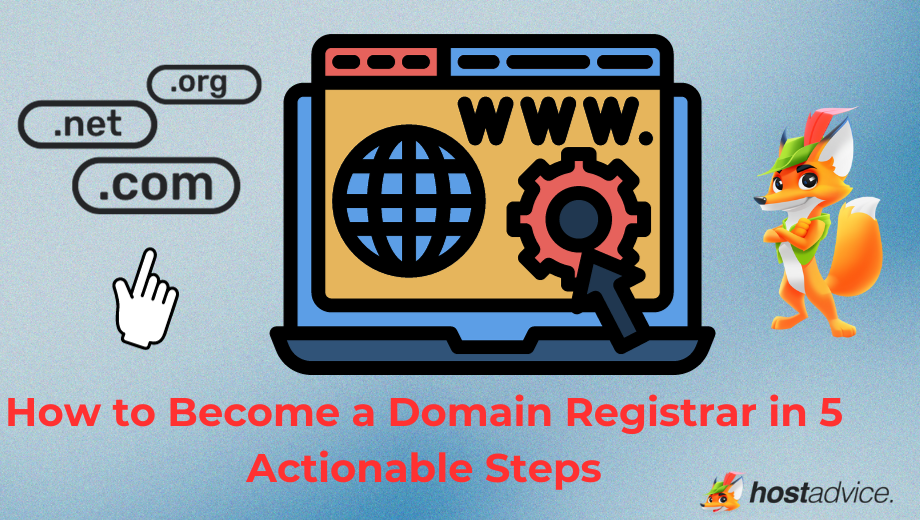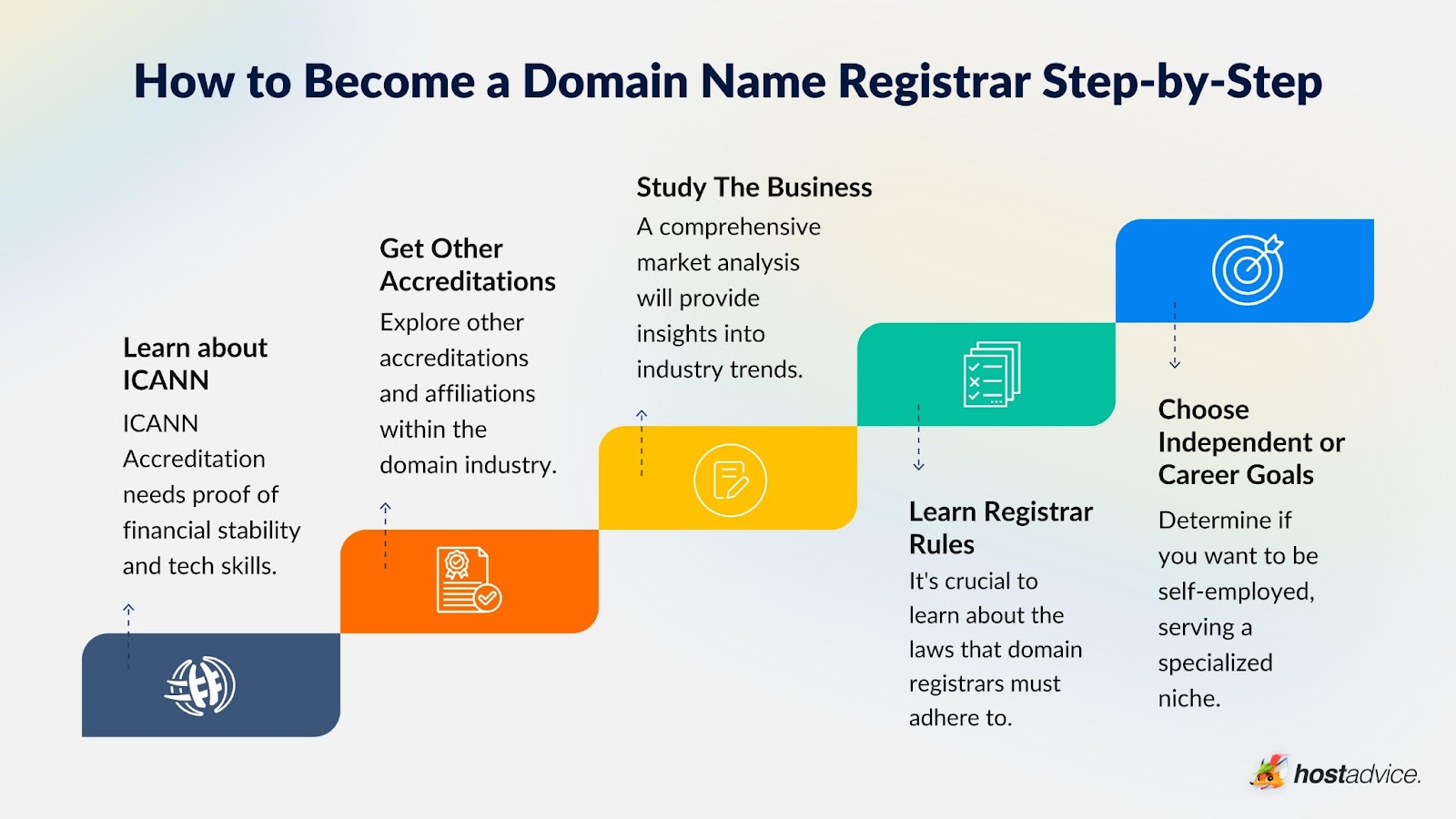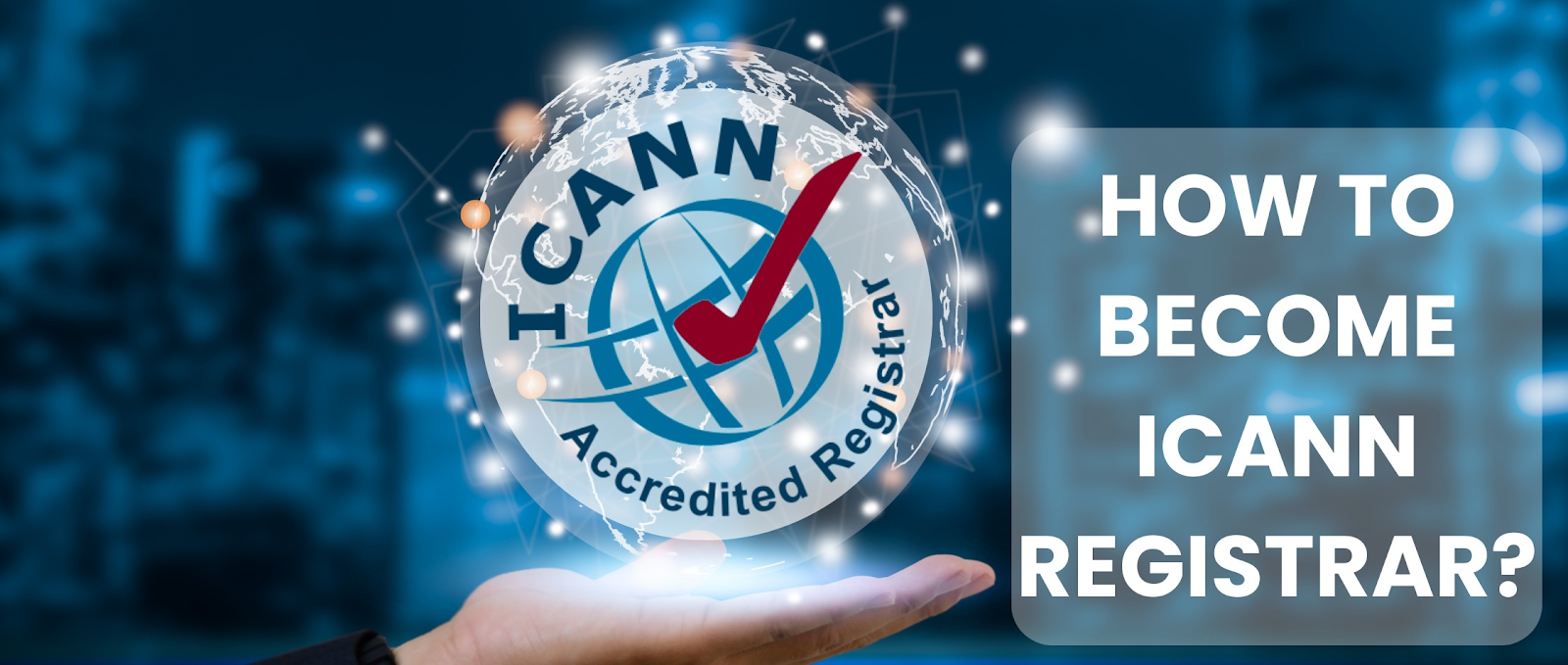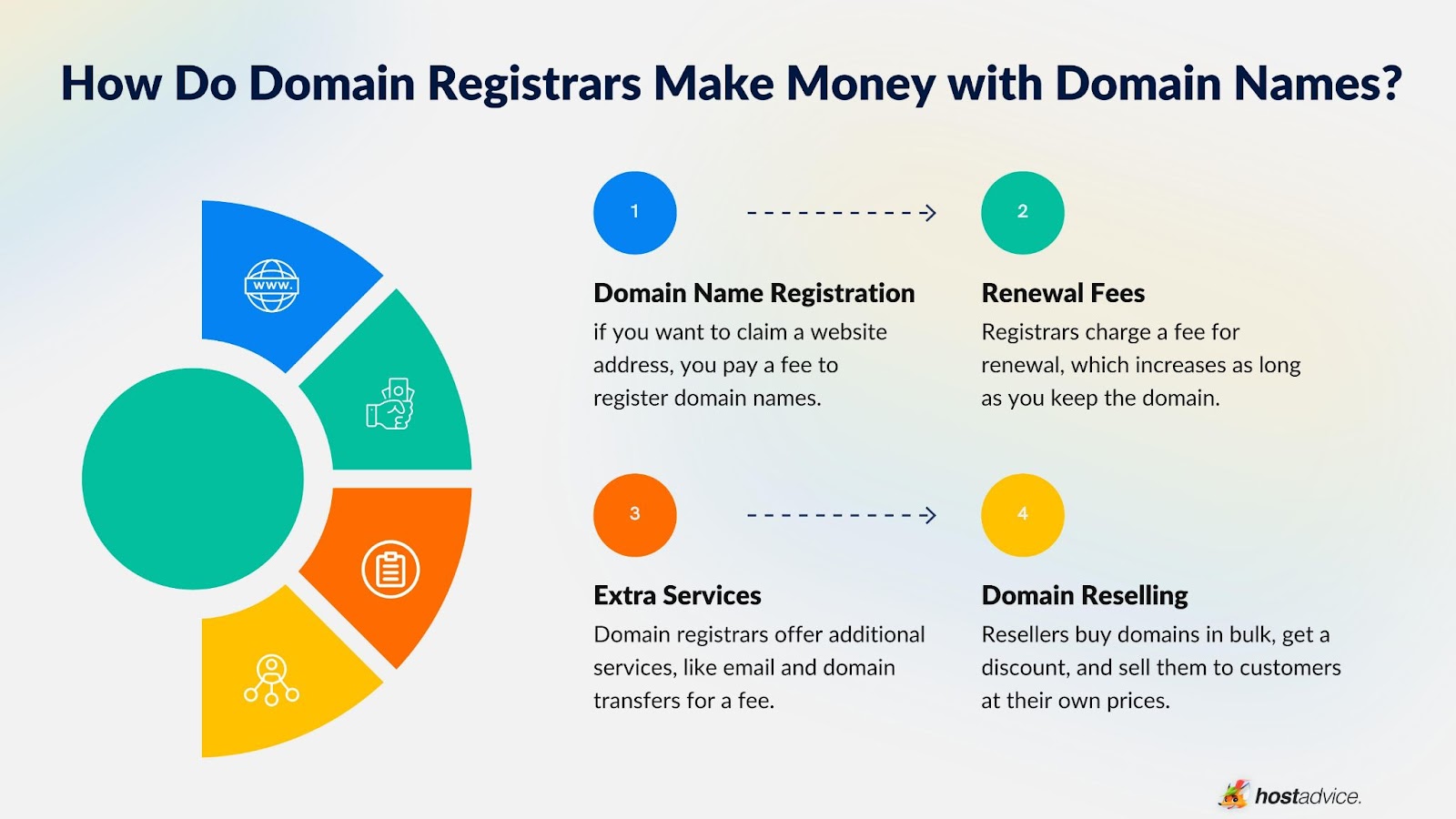
Becoming a domain registrar offers opportunities to generate a steady income through domain sales and renewals.
In this article, we’ll explore the step-by-step process of how to become a domain registrar.
- Before you start offering domain services, you must get accredited by ICANN
- ICANN accreditation requires financial stability, technical infrastructure, and compliance with ICANN’s policies
- Domain registrars make money through domain registration, renewal fees, offering additional services, and domain reselling
- Consider domain reselling as a way to enter the domain industry
How to Become a Domain Name Registrar Step-by-Step

The 5 steps below are general steps involved in becoming a domain name registrar. Steps specific to ICANN will be discussed in another section below.
Step 1: Learn about ICANN Accreditation
ICANN (Internet Corporation for Assigned Names and Numbers) is the global governing body for domain name management.
You must do thorough research on the qualifications, standards, and application procedure for ICANN certification.
To follow ICANN’s policies, you need:
- Proof of financial stability
- Tech skills
- Commitment
Your financial stability should be solid enough to ensure your long-term operation as a registrar. This often involves showcasing your business’s financial resources. Technically, you’ll need a robust infrastructure in place, particularly for DNS (Domain Name System) services.
The application process involves submitting extensive information about your business, infrastructure, and policies to ICANN.
You should be ready to provide detailed documentation that proves your compliance with ICANN’s standards.
Step 2: Find Out About Other Accreditations
ICANN accreditation is the primary authority for domain registrars. However, it’s better to explore other accreditations and affiliations within the domain industry.
Different countries or regions have accreditation bodies or regulations you should know and adhere to.
While researching, make sure you identify and understand these accreditations. They could require legal and operational compliance, but it depends on the geographical area of operation.
Examples of ICANN alternatives include OpenNIC and InterNIC. These two alternatives provide a non-national alternative to traditional domain registries.
Step 3: Study the Domain Registration Business
Before starting your domain registration business, it’s important to gain an in-depth understanding of the industry.
Spend time studying
- Market trends
- Pricing strategies
- Customer expectations
- Your competitors
A comprehensive market analysis will provide insights into industry trends. It will also help you identify the demand for domain names. It’s important to know your competitors, their offerings, pricing structures, and marketing strategies.
Also, understand your potential customers’ needs and expectations.
This includes providing user-friendly registration platforms. Additionally, efficient customer support is important for your success as a domain registrar.
Best Cheap Domain Hosting Providers User Rating 4.6 4.9 5.0 Prices From $0.99 From $13.00 From $12.53
Step 4: Learn About Other Rules for Domain Registrars
In addition to ICANN’s policy, it’s crucial to learn about the laws that domain registrars must adhere to. These might differ according to your jurisdiction and the areas you want to offer your services.
Consult legal experts to ensure full compliance with local, national, and regional laws related to domain registration.
This step will help you handle legal issues associated with domain registrar operations.
Step 5: Work Toward Independent or Career Domain Registrar Goals
Lastly, think about your long-term objectives as a domain registrar.
Decide if you want to be self-employed, serving a specialized niche.
Also, determine if you want to further your career within a bigger registrar company.
As you begin the domain registration business, your goals will be the cornerstone of your company strategy.
How to Become an ICANN Registrar: What You Need to Know

If you prefer to become an ICANN accredited registrar over other options, make sure to follow the requirements below and learn about the possible fees you may encounter.
ICANN Registrar Requirements
Becoming a registrar accredited by ICANN involves meeting specific requirements and going through a formal accreditation procedure.
Here is an outline of the requirements for becoming an authorized registrar:
1. Review Qualification Criteria
Start by reviewing the qualification criteria outlined in the Statement of Registrar Accreditation Policy.
This document defines the standards and requirements for becoming an accredited registrar. It’s essential to understand these criteria thoroughly.
2. Financial Considerations
Familiarize yourself with the financial considerations for becoming an ICANN-accredited registrar. This includes understanding the financial stability requirements and financial statements you need to provide.
Ensure you meet the financial requirements outlined in the Registrar Accreditation Agreement (RAA).
3. Review Governing Agreements and Policies
Understand the governing agreements and policies that apply to all ICANN-accredited registrars. These include the RAA and various ICANN policies.
Familiarize yourself with the obligations and responsibilities specified in these agreements and policies.
4. Apply for Registrar Accreditation
- Fill out the ICANN form to apply for registrar accreditation. The link to the form can be found on this page.
- Ensure your application is detailed, specific, and includes all the necessary supporting documents. Delays in the application processing often result from missing documents or incomplete/vague answers to application questions.
- Questions or clarifications regarding your application can be directed to accredit@icann.org.
ICANN Registrar Fees
Before starting the registrar accreditation procedure, carefully evaluate and consider the following ICANN registrar fees.
1. Annual Accreditation Fee with ICANN
All domain name registrars must pay a yearly accreditation fee of US$4,000. Registrars can pay it at once. Or, if preferred, they can make four payments of US$1,000 each, due every quarter..
The annual accreditation fee is billed on the 15th day of the month when the registrar’s account receives the accreditation approval. This fee covers the registrar’s accreditation for a full year, and the payment cycle continues if the registrar maintains the agreement with ICANN.
2. Commercial Insurance
Registrars need commercial insurance to protect themselves from liabilities and risks associated with domain registration services. As a result, ICANN encourages registrars to pay Commercial General Liability Insurance of at least $500,000.
The average annual cost of this insurance is $200. As a potential registrar, it’s important to include this expense in your budget to meet ICANN’s requirements.
3. ICANN Yearly Fee
The Internet Corporation for Assigned Names and Numbers imposes a compulsory annual fee of $0.18.
This cost is for each year of domain registration, renewal, or transfer. For instance, the cost of registering a .com name for one year is $0.18, while the cost for two years is $0.36.
The total price of the domain at the time of purchase will include this yearly fee. Here is the list of domains subject to this fee.
4. Application Fee
The application fee for registrar accreditation costs $3,500. Note that this fee is non-refundable, regardless of the outcome of your application.
It doesn’t matter if it gets approved, denied, or if you decide to withdraw it. This fee covers the administrative costs associated with the review and processing of your domain registry application.
What Happens After Submitting Your Application?
After submitting your application materials, ICANN will conduct an initial review.
Afterward, they will contact you with instructions on how to pay the application fee.
This will occur if your application is complete and meets the necessary requirements. It’s a critical step in the accreditation process, and it shows your commitment to pursuing your domain company registration.
If your reason for starting a domain business is to avoid paying yearly domain renewal fees, it’s not worth it. Registrar accreditation is expensive. So consider it if you want to offer domain registration services as a business.
The Relationship Between Domain Registrar and Hosting
Understanding the relationship between a domain registrar and hosting is essential for anyone stepping into the online world. These two elements, while distinct in function, work in tandem to bring a website to life.
- Domain Registrar is the entity responsible for managing the reservation of internet domain names. When you decide to build a website, the first step is to register a unique domain name through a domain registrar. This registrar acts as the facilitator, ensuring that your chosen domain name is unique and registered solely to you.
- Hosting Services, on the other hand, are where your website’s content—its text, images, and other files—are stored and accessed from. Without hosting, your domain name would lead to an empty space. A hosting provider allocates space on a web server for your website’s files, allowing it to be accessible over the internet.
Although they are separate services, coordination between a domain registrar and a hosting service is necessary for any functional website. Often, providers offer both domain registration and hosting, simplifying the process for website owners.
Top Web Hosts Offering Domain Registration Services
How Do Domain Registrars Make Money with Domain Names?

Domain registrars make money through various means related to domain names.
Here are the primary ways in which they earn:
- Domain name registration— Domain registrars primarily make money from selling domain names. The price of a domain name largely depends on the domain extension (TLD).
- Renewal fees—After the first purchase, buyers who choose to renew their domain name subscription also serve as a predictable stream of income for registrars.
- Additional services—Domain registrars also earn from selling services like email and domain hosting, domain transfers, or SSL certificates.
- Domain reselling—Domain resellers buy domains in bulk from you to get a discount and then sell them to customers at their own prices.
Conclusion: Become a Domain Reseller
Becoming a domain reseller is your key to unlocking new opportunities and income in the domain industry. If this path interests you, there are many resources to help you get started.
Read our free resources on the Best Web Hosting services.
Short On Time? Review The Best Web Hosting Services On Our List
| Provider | User Rating | Price | Expert & User Reviews | |
|---|---|---|---|---|
 | 4.6 | $1.99/month | Hostinger Review | Visit Hostinger |
 | 5.0 | $2.49/month | HostArmada Review | Visit HostArmada |
 | 5.0 | $2.95/month | ChemiCloud Review | Visit ChemiCloud |
Next Steps: What Now?
Now that you have a better understanding of how to become a domain registrar, consider the following steps:
- Explore our article on Domain Name Management
- Learn about the different Types of Domains and how to choose a domain name
- Take a look at the Top 10 Domain Hosting Providers







